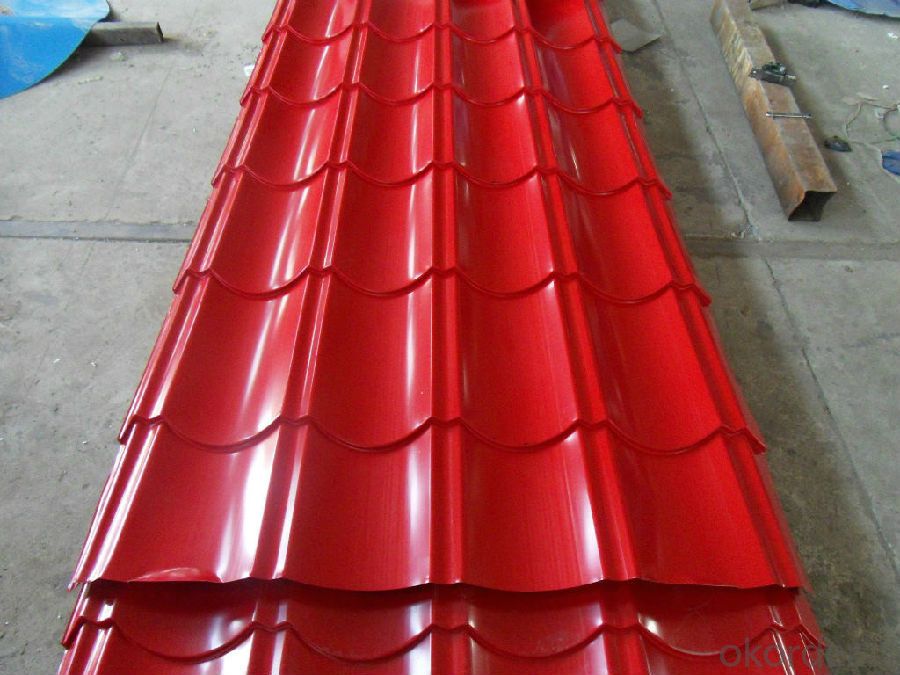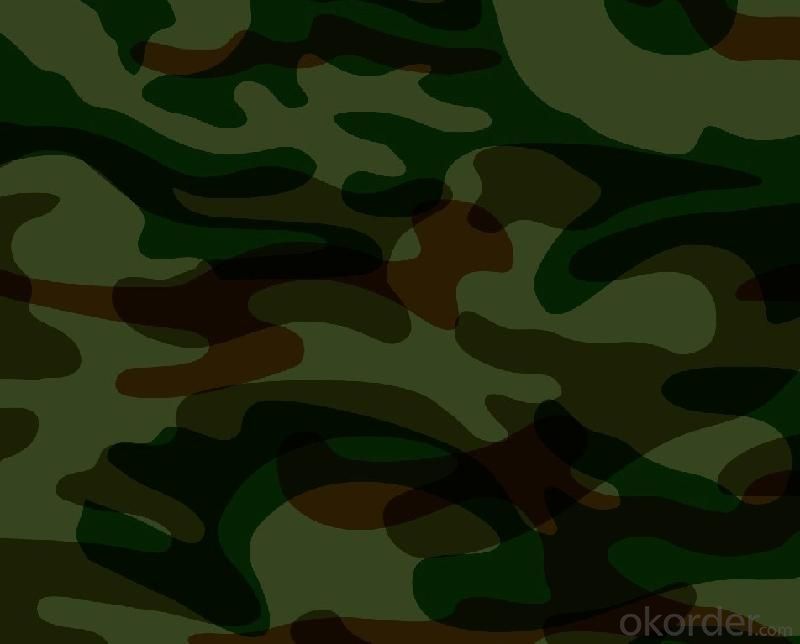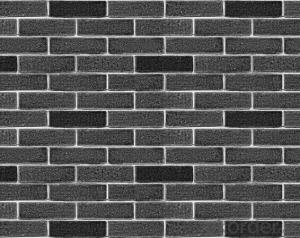PPGI Steel Coil JIS G3312 in Low Price
- Loading Port:
- China main port
- Payment Terms:
- TT OR LC
- Min Order Qty:
- 50 m.t.
- Supply Capability:
- 10000 m.t./month
OKorder Service Pledge
OKorder Financial Service
You Might Also Like
1. PPGI Steel Coil JIS G3312 in Low Price
With GI as base material, after pretreatment (degrease and chemical treatment ) and liquid dope with several layers of color, then after firing and cooling, finally the plate steel is called pre-painted galvanized (aluzinc) steel. Pre-painted galvanized steel is good capable of decoration, molding, corrosion resistance.
2.Main Features of the Pre-Painted Galvanized/Aluzinc Steel Coil:
• Excellent process capability
• Smooth and flat surface
• Good formability
• Good visual effect
3.Pre-Painted Galvanized/Aluzinc Steel Coil Images


4.Pre-Painted Galvanized/Aluzinc Steel Coil Specification
Standard: AISI, ASTM, BS, DIN, GB, JIS
Grade: DX51D, DX52D
Thickness: 0.17-2.0mm
Width: 20-1250mm
Length: customized
commoidty: pre-painted galvanized steel coil
Thickness: 0.13-4.0mm
width: 20-1250mm
zinc coating: 40-180g/m2
printing thickness: top side: 20+/-5 microns, back side: 5-7 microns
color: all RAL color
surface treatment: color coated
coil weight: 4-7 tons
coil ID: 508/610mm
5.FAQ of Pre-Painted Galvanized/Aluzinc Steel Coil
1. How to guarantee the quality of the products?
We have established the international advanced quality management system,every link from raw material to final product we have strict quality test;We resolutely put an end to unqualified products flowing into the market. At the same time, we will provide necessary follow-up service assurance.
2. How long can we receive the product after purchase?
Usually within thirty working days after receiving buyer’s advance payment or LC. We will arrange the factory manufacturing as soon as possible. The cargo readiness usually takes 15-25 days, but the shipment will depend on the vessel situation.
- Q:How are steel coils used in the manufacturing of steering columns?
- Steel coils are used in the manufacturing of steering columns as they provide the necessary strength and flexibility to withstand the forces and vibrations experienced during steering. The coils are shaped and formed into the desired design, allowing for the smooth and controlled movement of the steering column.
- Q:I have a 03 jeep wrangler and looking to upgrade to black wheels. I was wondering if the difference between steel and alloy wheels is worth paying double.
- steel is steel is steel- they will always be heavy you would have to weigh them to find out--NOW if you are going to alloy wheels they are typically aluminum and yes they are lighter -this is good because it lightens your un-sprung weight and is less harmful to your suspension-good for your auto
- Q:In pounds per square inch what is the tensile strength of strong steel?
- Depends on what you mean by strong steel. Typically the ultimate strength/yield point of steel used for building structures (beams, columns, joists, plates) is in the range of 36,000 to 50,000 psi. The strength is specified by the designer (in the U.S.) by its ASTM designation. e.g. ASTM A36, A572, A500, A307, A325 ... A36 is typical mild steel, A572 Grade 50 (50,000 psi) is often called high-strength Really high strength steels such as pre-stressing strand can have ultimate strengths more than 10 times these values.
- Q:What are the different types of steel coil cutting processes?
- There are several different types of steel coil cutting processes, including shearing, slitting, and laser cutting.
- Q:I'm pretty sure that this topic has been beaten to death by now. But, I still can't get a definite answer. With stainless steel, you get better corrosion resistance, and you will hold and edge longer. With carbon steel, you will hold a sharper edge, and you could forge a knife blade longer than 2 ft without breakage. I'm personally a fan of stainless steel ( the 440 grade stuff ), just because it seems to hold up to use and abuse better in the long run. HOWEVER, I have NEVER had a factory made knife break on me. I don't think that they would try to sell you a knife that didn't do what it was meant to do, at least to a reasonable degree. (I work for a living, and can't afford a custom $600 knife.) What do you think? Is this a pointless topic? Will there ever be a winner?
- If your talking about a folding pocket knife, I think that it's basically six one way and a half dozen the other. I actually do prefer stainless for my pocket knives. I don't want to oil a knife to the degree I feel carbon requires, only to then stick it my pocket to attract dirt to the knife and oil to my pants. I'm the exact opposite on sheath knives though. I like 1095 carbon steel, plain edge sheath knives. I'll thrash on them HARD, and I rarely have major edge problems. Of course, I require them to be coated with some kind of powder coat or the like, because they can rust, but I do try and keep them clean and dry when in the sheath, so they won't pit the uncoated edge. My reasons for this sheath knife preference is multi-fold. First, these knives are simply affordable. I don't spend $80 dollars on a outdoors sheath knife. I use the tool too hard to want to spend more. I don't like the more traditional stainless steels such as AUS-8, 420HC, and 440C (not to mention the HORRENDOUS 440A) because I feel that the all else being equal, a stainless blade will bend before a carbon blade will break. I also think that carbon holds an edge at least as well, if not better, than traditional stainless, and it's much easier to hone. I don't know much about these new laminates, other than the very hard, but not so tough. They seem to be POSSIBLY too brittle for my use. That, combined with the fact that they cost a FORTUNE, means that I just won't be considering them.
- Q:I am in the market for a good hunting knife under $100. I am primarily looking for a knife that will keep it's edge. What type of steel should I be looking for?
- Take a close look at the Cold Steel Master Hunter. I can't wait for my hunting knife to die so I can go get one.
- Q:PLEASE PLEASE PLEASE!!!!!!!! HELP MEEEEEEEE!!!!!!! I need to know how can i prevent steel from rusting when it is exposed to water or salt water or vinegar. PLEASE TELL ME A LOT OF WAYS THAT I COULD PREVENT IT!!!!!!!!!!!!!!!!!!!!!!!!!!!!!!!!!!!!!!
- Coat it in molten plastic, or use stainlessteel
- Q:How is steel different than iron?How many different kinds of steel are there?What type is the strongest?Which type is the weakest?
- As first answer says, if you look at the number of commercial steel alloys available and consider that any given alloy can be heat treated to a wide range of physical properties, there are thousands and thousands of potential combinations. Technically, steel is an alloy of Fe and C but there are Fe-C alloys that are called cast irons, not steel, and... there are lots of alloy steels which have significant amounts of other elements added like Cr, Ni, Nb, V, Mo, etc. Fe alloys that have a lot of Cr and or Ni added are called stainless steels and there are dozens of them and many of them can be heat treated to produce a wide range of properties. As far as the strongest or the weakest, you have to get really specific about exactly what you mean because some steels are designed for room temperature properties, some are designed for elevated temperature properties, some for static loads, some for impact loads, some for wear resistance, etc, etc.. Steels make up the largest family of metal alloys (by weight and by volume) that humans use. There are a number of reasons for this but the big reasons include: 1) there is a LOT of iron on earth 2) it is relatively cheap to produce 3) you can easily change the physical properties over a every wide range. As an example... you can take a piece of steel that is so brittle it will shatter if you drop it on the floor and heat treat it so you can bend it like a pretzel without cracking and then heat treat it again to make it very strong and tough (resistant to fracture).
- Q:How are steel coils coated?
- Steel coils are typically coated through a process known as coil coating, which involves applying a protective layer to the surface of the steel. This is done by passing the coil through a series of rollers that apply the coating material evenly across the entire surface. The coating can be applied using various methods such as roll coating, spray coating, or electrostatic coating, depending on the desired finish and properties. The coated steel coils are then cured or baked to ensure the coating adheres properly and provides the desired level of protection and durability.
1. Manufacturer Overview |
|
|---|---|
| Location | |
| Year Established | |
| Annual Output Value | |
| Main Markets | |
| Company Certifications | |
2. Manufacturer Certificates |
|
|---|---|
| a) Certification Name | |
| Range | |
| Reference | |
| Validity Period | |
3. Manufacturer Capability |
|
|---|---|
| a)Trade Capacity | |
| Nearest Port | |
| Export Percentage | |
| No.of Employees in Trade Department | |
| Language Spoken: | |
| b)Factory Information | |
| Factory Size: | |
| No. of Production Lines | |
| Contract Manufacturing | |
| Product Price Range | |
Send your message to us
PPGI Steel Coil JIS G3312 in Low Price
- Loading Port:
- China main port
- Payment Terms:
- TT OR LC
- Min Order Qty:
- 50 m.t.
- Supply Capability:
- 10000 m.t./month
OKorder Service Pledge
OKorder Financial Service
Similar products
New products
Hot products
Related keywords






























